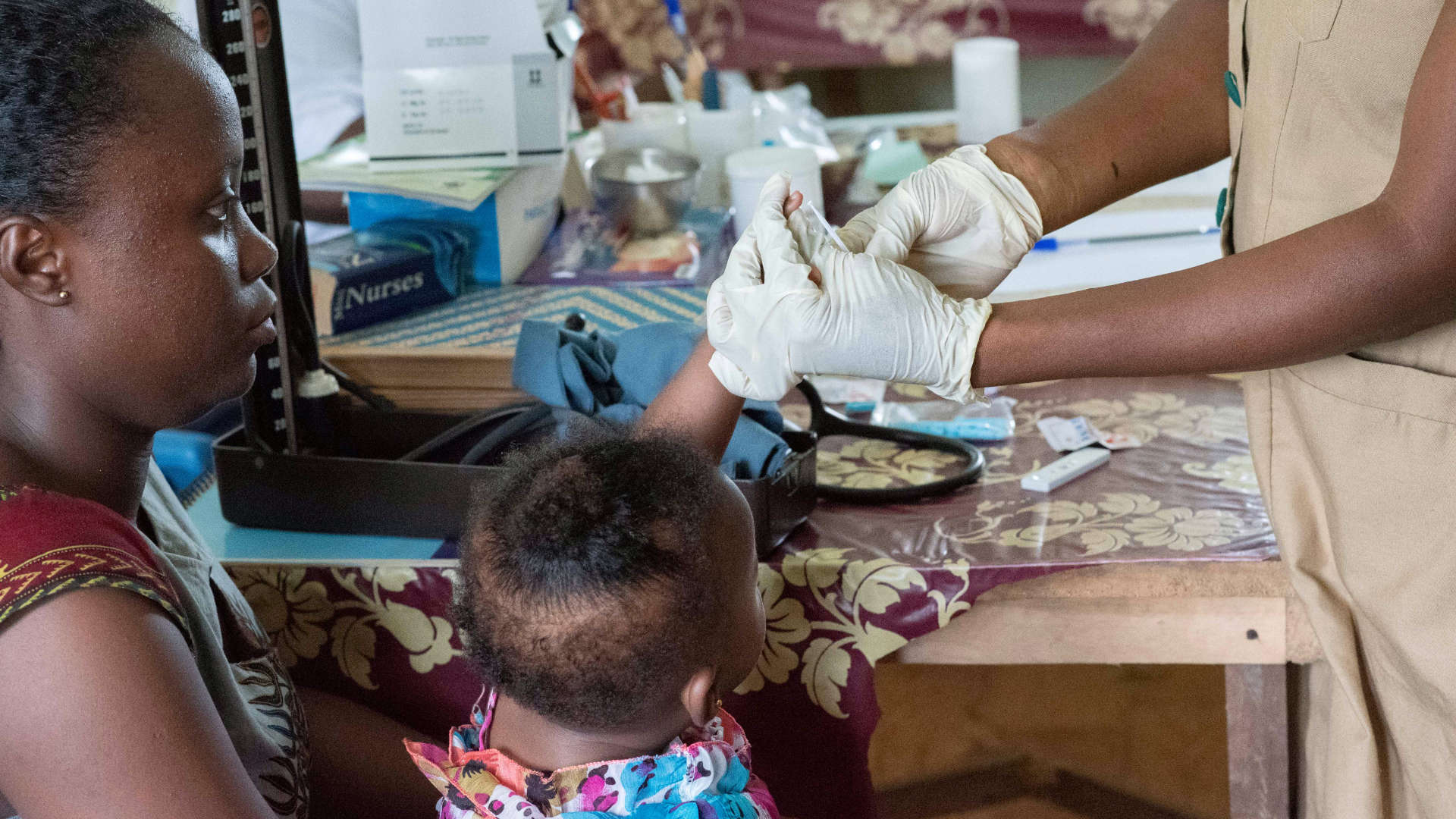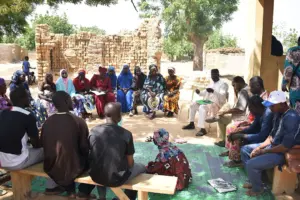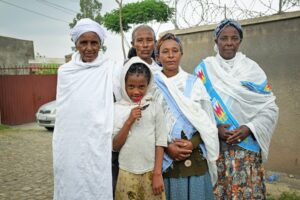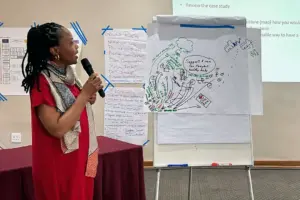
Health Systems Strengthening
A midwife conducts a rapid diagnostic test for malaria on an infant in Ghana. Photo credit: URC
Health Systems Strengthening
Strengthening health service delivery is crucial to the achievement of universal health coverage and the 2030 Sustainable Development Goal 3: to ensure healthy lives and promote well-being at all ages. Improving health systems has been URC’s core mission for more than 40 years, enabling the delivery of people-centered, quality care and making services accountable, affordable, accessible, and reliable.
We support governments to lead and efficiently manage their systems and resources – including competent, adequately supported, motivated, and equitably distributed health care workers – to deliver quality health services.
We strengthen the capacity of leaders and managers to plan, deliver, evaluate, and continuously improve quality services. We engage and empower people, families, and communities to make full use quality health services and demand people-centered care.
Digital Health
URC works with ministries of health, civil society, and the private sector to harness the full potential of digital technologies for improved health outcomes and better decision-making. URC envisions a world where digital technologies are used equitably to improve disease surveillance, extend the reach of health services, support health workers, and build healthier communities.
In support of community-based drug rehabilitation (CBDR) efforts for the USAID RenewHealth project, the Philippines Ministry of Health and URC worked together to build and launch the CBDR Portal. This powerful website serves as a hub for CBDR content, tools, and services, including a learning management system for community facilitators/coaches and an information management system for local government units.
Mobile phones are the most efficient way for health professionals to reach homebound individuals facing mental health challenges. The USAID RenewHealth project – in collaboration with the Philippine Department of Health – successfully launched the first ever mobile application to support Filipinos’ mental health needs. The app, called Lusog Isip, is available in both English and Filipino.
The USAID Regional Health Integration to Enhance Services in East Central Uganda (RHITES-EC) Activity used open-source software to create a cloud-based platform to capture, process, and analyze relevant and real-time data from resource-constrained environments using Android phones. The Results Dispatch module improved turn-around times for lab results, which enabled same-day access to viral load (VL) test results. The Viral Load Health Information Exchange module was rolled out at priority antiretroviral therapy sites to ensure real-time access to VL test results by clinicians.
The USAID Defeat TB Activity utilized innovative approaches including GIS mapping using Q-GIS to identify areas with high TB burdens to inform case finding efforts.
Supply Chain
A key part of a strong and resilient health system is sustainable access and appropriate use of safe, effective, quality-assured, and affordable health commodities. Our project teams work closely with national and sub-national health care providers, logisticians, policy-makers, decision-makers, communities, the private sector, and others to design and implement stronger supply chain systems.
Our supply chain interventions have successfully improved the delivery of drugs and other commodities in many countries by:
Forecasting, supply planning, and information systems: URC has worked with key stakeholders to optimize forecasting and supply planning by building local ability to use modern methodologies, ranging from simple, consumption-based methods to complex, statistics-based regression analysis of historical data and development of epidemiological profiles of the population.
Procurement, distribution, and quality assurance of health commodities: URC has used technology to streamline procurement processes, connect people, and create more transparent and efficient solutions to supply chain challenges. This includes using GS1 barcode technology, mobile applications, and web-based forecasting tools. We have helped health facilities prepare for disease outbreaks by setting up emergency commodity order systems with national agencies. URC also has supported last-mile distribution of health commodities, such as COVID-19 vaccines, malaria drugs, and long-lasting insecticidal nets.
Human workforce development and institutional capacity building: URC provides training on all components of the logistics cycle – forecasting, procurement, warehousing, transportation, and distribution. We coach and provide on-the-job training to personnel to analyze causes of quality or performance gaps, create and test improvements, and use data to determine the most effective changes.
Projects
Current and recent past projects with a strong health systems strengthening component include:
Building on the achievements of the USAID Regional Health Integration to Enhance Services in Northern Uganda Activity (RHITES-N, Acholi) Activity and the USAID Regional Health Integration to Enhance Service in East Central Uganda Activity (RHITES-EC), URC leads the USAID Uganda Health Activity (USAID UHA) which will accelerate inclusive access to respectful, people-centered care for Ugandan families, propel the country across the finish line for sustainable HIV epidemic control, and ensure that family health and HIV interventions and outcomes are anchored in strong local health systems that use data to drive results and efficiently manage human, institutional, and financial resources.
USAID UHA supports governance and health systems strengthening interventions across 67 health districts and five cities in seven diverse sub-regions of Uganda, working to ensure that local health service delivery networks improve their performance and management systems to equitably deliver cost-effective, high-quality health services.
In Ghana, URC leads the implementation of the USAID Quality Services for Health Activity (Q4H), which supports the Ghana government’s leadership to promote and oversee improved quality health services across the public and private health sectors at the national, regional, district, sub-district, and facility levels.
In Jordan, URC also leads the USAID Health Services Quality Accelerator Activity. This Activity strengthens Jordan’s Ministry of Health leadership and governance capacity to address areas of weak performance and improve quality of care to improve reproductive, maternal, newborn, and child health outcomes.
In the Philippines, limited access to health facilities and providers has adversely impacted population health in the Bangsamoro Autonomous Region in Muslim Mindanao. URC supports the Ministry of Health in this region to achieve a self-reliant health system under the USAID Bangsamoro Autonomous Region in Muslim Mindanao for Health (BARMMHealth) Project by strengthening the capacity of the government, civil society, and communities to develop, implement, and finance solutions to improve health. The project works to change social norms and encourage healthy behaviors among underserved adolescents, youth, women, and men; strengthen the quality of family planning and maternal and child health services; and bolster public health policies and systems.


